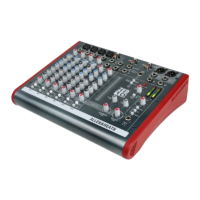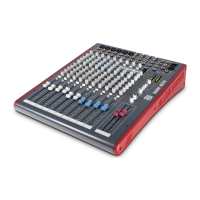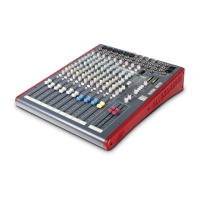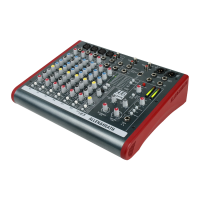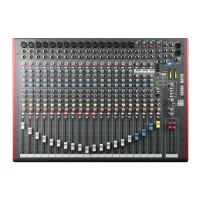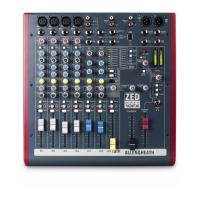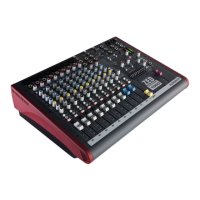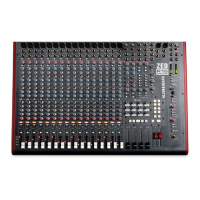Do you have a question about the ALLEN & HEATH ZED-18 and is the answer not in the manual?
Details the conditions under which the warranty is valid, including installation and operational requirements.
Instruction to retain and follow safety and operating instructions for future reference.
Warning against operating the console with its covers removed to prevent electric shock.
Guidance on connecting to appropriate mains power units and using provided cords.
Advice on safely routing the power cord to prevent it from being walked on or pinched.
Emphasizes the necessity of proper earthing and not defeating the ground connection.
Precautions regarding exposure to rain, moisture, or liquids to reduce shock risk.
Instructions to ensure adequate airflow by not obstructing ventilation slots.
Guidance on avoiding locations with excessive heat, direct sunlight, or vibration.
Specifies that servicing should only be done by qualified technical personnel.
Instructions for correct console installation and connection to audio equipment.
Advice to prevent physical damage to the console's controls and cosmetics.
Guidelines for operating and storing the console in suitable environmental conditions.
Instructions on how to clean the console and its controls properly using soft materials.
Recommendations for safely transporting the console, whether free-standing or rack-mounted.
Warning about the risks of prolonged exposure to high volume sound and potential hearing loss.
Discusses the suitability of ZED mixers for live mixing, recording, and installations.
Explains the two-stage design and gain structure of the pre-amplifiers for optimal signal.
Details the 3-band EQ on mono channels and 2-band EQ on stereo channels.
Describes the four auxiliary buses and their configuration for monitoring or effects.
Highlights the variety of inputs available on mono and stereo channels for flexibility.
Explains the flexible and easy USB audio interface implementation for computer connectivity.
Specifies the operating levels for various input types like XLR, line, and insert.
Specifies the operating levels for various output types like main, aux, and record.
Details the frequency response characteristics for different inputs and outputs.
Presents Total Harmonic Distortion plus Noise figures for various signal paths.
Information on analogue and USB headroom from nominal levels.
Specifications for the USB audio interface, including compliance and sample rate.
Lists noise figures for different output configurations and mixer models.
Describes the XLR microphone input connection and wiring standards.
Explains the 1/4" jack socket for line-level signals and its function.
Details the 1/4" jack for insert send and return signals, and its nominal level.
How to adjust input amplifier gain to match signal levels from XLR or line inputs.
Describes the filter used for reducing pop noise and rumble from microphone signals.
Explains the High Frequency equalizer and its effect on higher audible frequencies.
Details the Mid Frequency equalizer and its range for adjusting mid-range audio.
Describes the Low Frequency equalizer and its response characteristics at the low end.
Describes the pre-fade auxiliary sends for monitoring and other purposes.
Details the post-fade auxiliary sends typically used for effects.
Explains how the pan control distributes signal to left and right stereo buses.
Describes the function of the mute switch for channels and buses.
Explains the Pre-Fade Listen function and clipping indicator for mono channels.
Controls the channel signal level to main and auxiliary buses.
Describes the additional stereo input via phono connectors.
Explains the 1/4" jack sockets for line-level stereo signals.
Adjusts the level of the stereo return input from off to maximum.
Controls whether the stereo return input is active, recommended to keep off when unused.
Selects how the stereo return signal is routed to the LR bus or stereo channel.
Adjusts the level of the Stereo I input from off to +10dB.
Details the 2-band EQ for stereo channels with specific corner frequencies.
Selects mono or stereo pairing for Aux 1 & 2 sends from the stereo channel.
Controls the level of pre-fade signals sent to Aux 1 & 2 buses from the stereo channel.
Controls the level of post-fade signals sent to Aux 3 & 4 buses from the stereo channel.
Adjusts the relative levels between left and right channels for stereo signals.
Mutes signals to main LR and auxiliary buses from the stereo channel.
Explains Pre-Fade Listen and clipping indicator for stereo channels.
Controls the stereo channel signal level to main and auxiliary buses.
Refers back to previous description of Stereo Input Channel STI.
Explains the ST2 channel with its additional 2 Track Return input.
Details the ST3 channel with its USB audio input and phono record outputs.
Describes the ST4 channel with its jack socket input and alternate output.
Explains the USB connector and how to select output sources using selector switches.
Describes the 1/4" jack sockets for Aux 1 to 4 outputs.
Explains the insert send and return jacks for the main Mix L/R.
Details the balanced XLR outputs for the main stereo mix.
Describes the mono sum output of the main left & right post-fade signals.
Explains the 1/4" and 3.5mm headphone connections and recommendations.
How to activate phantom power for microphones, with safety warnings.
Describes the LED meters for monitoring signal levels from monitor or PFL sources.
Adjusts the volume for the headphone output signal.
Selects signal sources for headphone monitoring and meters based on priority.
Controls the volume for a separate alternate output, useful for monitor speakers.
Selects signal sources for the alternate output, like pre-fade or monitor signals.
Adjusts the master levels for the Aux 1 and 2 outputs.
Controls the main L R output levels with high-quality 100mm faders.
Explains the stereo bi-directional USB 1.1 compliant audio CODEC and its computer compatibility.
Specific volume settings for Windows XP/Vista operating systems when using the USB interface.
Specific volume settings for Windows 7 operating systems, noting its treatment as mic source.
Lists the main capabilities and features of the SONAR XI LE software.
Step-by-step guide for installing the SONAR LE software from the included disk.
Instructions on enabling input echo for monitoring and recording within SONAR LE.
Utilize post-fade Aux 3 & 4 sends for effects, maintaining proportion with channel fader.
Select Aux 3-4 on the USB output selector switches for effects routing.
The USB lead carries digital signals to and from the computer for effects processing.
Select USB Device Left for Aux 3 or Right for Aux 4 as input for the software track.
Use a send bus in software as you would a hardware mixer for effects routing.
Assign an effect from your software plug-in list to the selected track.
For reverb, use 100% wet mix and reduce pre-delay to compensate for USB latency.
Send the output of the software group or bus to the USB Device.
Set the return level and select USB ON to monitor the effect return.
Use the USB return with stereo channel ST3 or route directly to L-R.
Add reverb for foldback (artists') monitors.
Diagrams showing how to wire insert cables for send/return connections.
Explains the use of Y-adapters for input/output splitting and connection.
Provides details on balanced and unbalanced cable wiring for various connector types.
Instructions on how to register the mixer for warranty and product updates.
| Type | Analog Mixer |
|---|---|
| Channels | 18 |
| Mic Preamps | 10 |
| Phantom Power | Yes |
| Aux Sends | 4 |
| USB | Yes |
| USB Audio Interface | Yes |
| USB Channels | 2 |
| Headphone Output | 1 |
| Main Outputs | 2 |
| Sub Outputs | 2 |
| Faders | 60mm |
| USB Interface | 2-in/2-out |
